Enterprise Law Autumn 2019 Intra-session Exam Solution
VerifiedAdded on 2023/01/19
|6
|1592
|35
Homework Assignment
AI Summary
This document provides a comprehensive solution to an Enterprise Law exam, addressing key legal concepts and principles. The solution analyzes three distinct scenarios: the first examines the distinction between an invitation to treat and an offer in the context of a book sale; the second explores the enforceability of a contract considering postal rules, revocation, and consideration in a goods sale agreement, including an amended contract with part payment; and the third focuses on the impact of a domestic agreement between cousins on contract enforceability, considering the intention to create legal relations. Each issue is analyzed using relevant case law, including Pharmaceutical Society of Great Britain v Boots Cash Chemists, Adams v Lindsell, Foakes v Beer, and Musumeci v Winadell Pty Ltd. The document emphasizes the importance of offer and acceptance, consideration, and the intention to create legal relations in forming a valid contract. The solution includes a conclusion for each part, summarizing the legal outcomes based on the facts and legal principles. The references are also provided at the end of the solution.
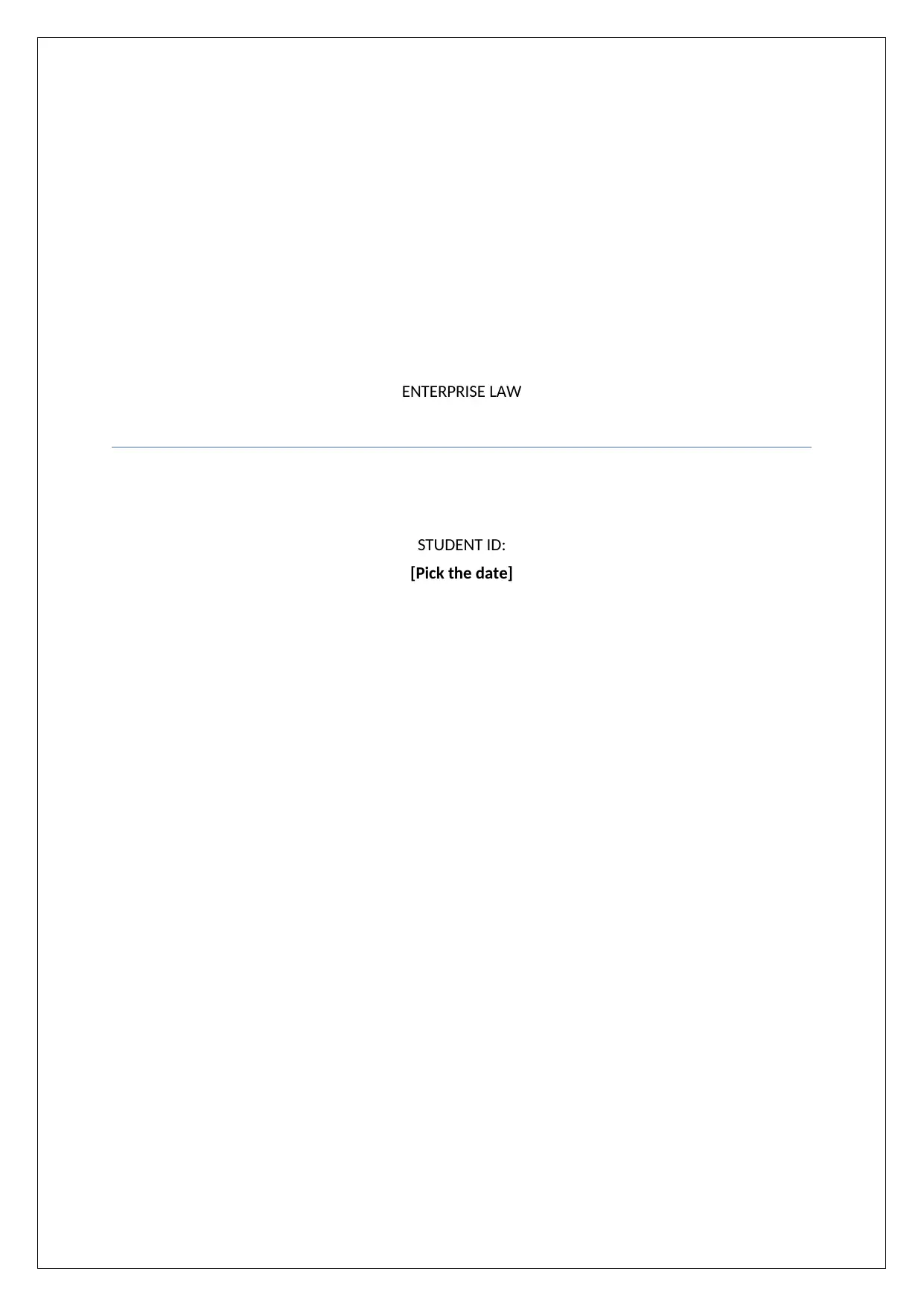
ENTERPRISE LAW
STUDENT ID:
[Pick the date]
STUDENT ID:
[Pick the date]
Paraphrase This Document
Need a fresh take? Get an instant paraphrase of this document with our AI Paraphraser
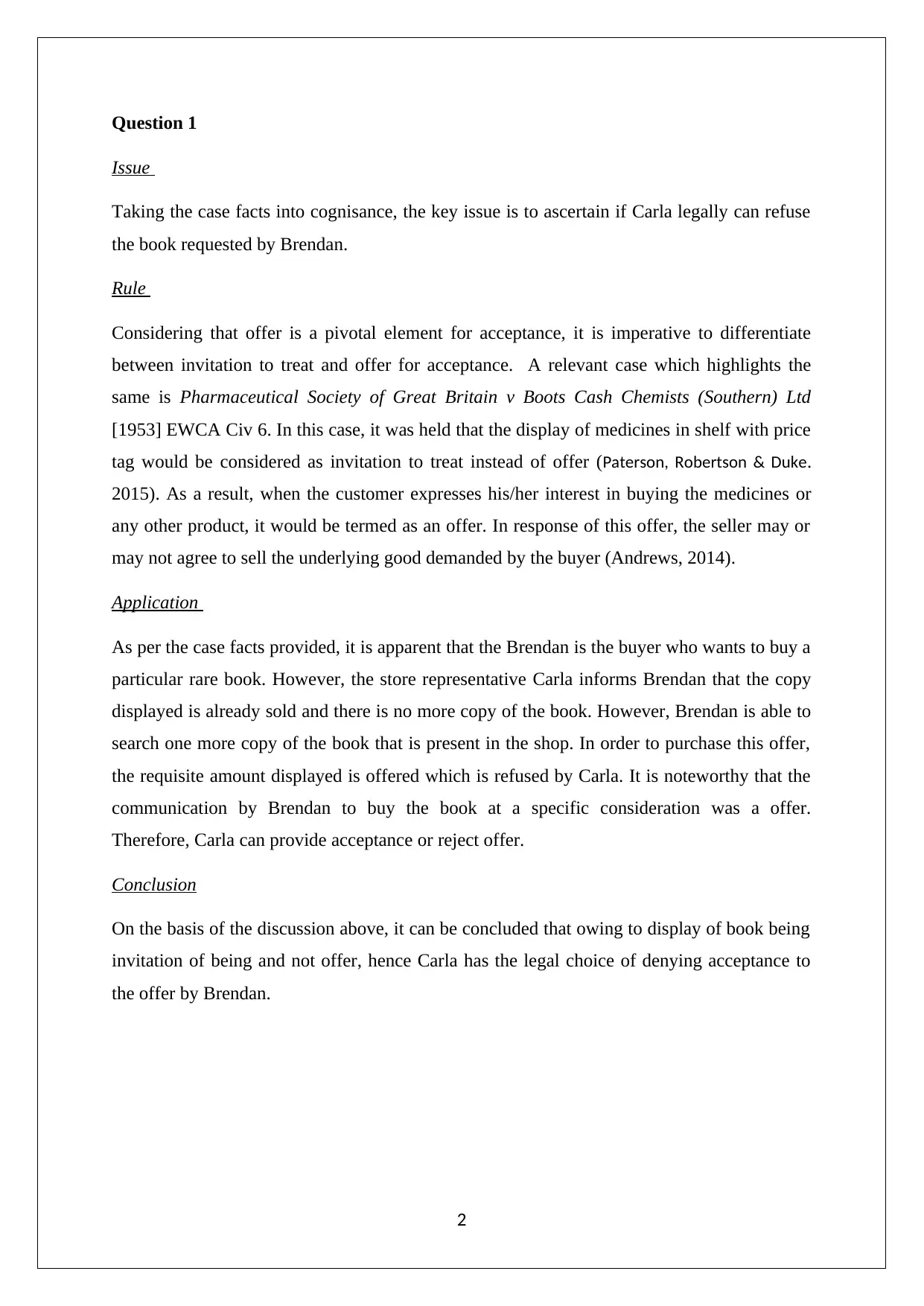
Question 1
Issue
Taking the case facts into cognisance, the key issue is to ascertain if Carla legally can refuse
the book requested by Brendan.
Rule
Considering that offer is a pivotal element for acceptance, it is imperative to differentiate
between invitation to treat and offer for acceptance. A relevant case which highlights the
same is Pharmaceutical Society of Great Britain v Boots Cash Chemists (Southern) Ltd
[1953] EWCA Civ 6. In this case, it was held that the display of medicines in shelf with price
tag would be considered as invitation to treat instead of offer (Paterson, Robertson & Duke.
2015). As a result, when the customer expresses his/her interest in buying the medicines or
any other product, it would be termed as an offer. In response of this offer, the seller may or
may not agree to sell the underlying good demanded by the buyer (Andrews, 2014).
Application
As per the case facts provided, it is apparent that the Brendan is the buyer who wants to buy a
particular rare book. However, the store representative Carla informs Brendan that the copy
displayed is already sold and there is no more copy of the book. However, Brendan is able to
search one more copy of the book that is present in the shop. In order to purchase this offer,
the requisite amount displayed is offered which is refused by Carla. It is noteworthy that the
communication by Brendan to buy the book at a specific consideration was a offer.
Therefore, Carla can provide acceptance or reject offer.
Conclusion
On the basis of the discussion above, it can be concluded that owing to display of book being
invitation of being and not offer, hence Carla has the legal choice of denying acceptance to
the offer by Brendan.
2
Issue
Taking the case facts into cognisance, the key issue is to ascertain if Carla legally can refuse
the book requested by Brendan.
Rule
Considering that offer is a pivotal element for acceptance, it is imperative to differentiate
between invitation to treat and offer for acceptance. A relevant case which highlights the
same is Pharmaceutical Society of Great Britain v Boots Cash Chemists (Southern) Ltd
[1953] EWCA Civ 6. In this case, it was held that the display of medicines in shelf with price
tag would be considered as invitation to treat instead of offer (Paterson, Robertson & Duke.
2015). As a result, when the customer expresses his/her interest in buying the medicines or
any other product, it would be termed as an offer. In response of this offer, the seller may or
may not agree to sell the underlying good demanded by the buyer (Andrews, 2014).
Application
As per the case facts provided, it is apparent that the Brendan is the buyer who wants to buy a
particular rare book. However, the store representative Carla informs Brendan that the copy
displayed is already sold and there is no more copy of the book. However, Brendan is able to
search one more copy of the book that is present in the shop. In order to purchase this offer,
the requisite amount displayed is offered which is refused by Carla. It is noteworthy that the
communication by Brendan to buy the book at a specific consideration was a offer.
Therefore, Carla can provide acceptance or reject offer.
Conclusion
On the basis of the discussion above, it can be concluded that owing to display of book being
invitation of being and not offer, hence Carla has the legal choice of denying acceptance to
the offer by Brendan.
2
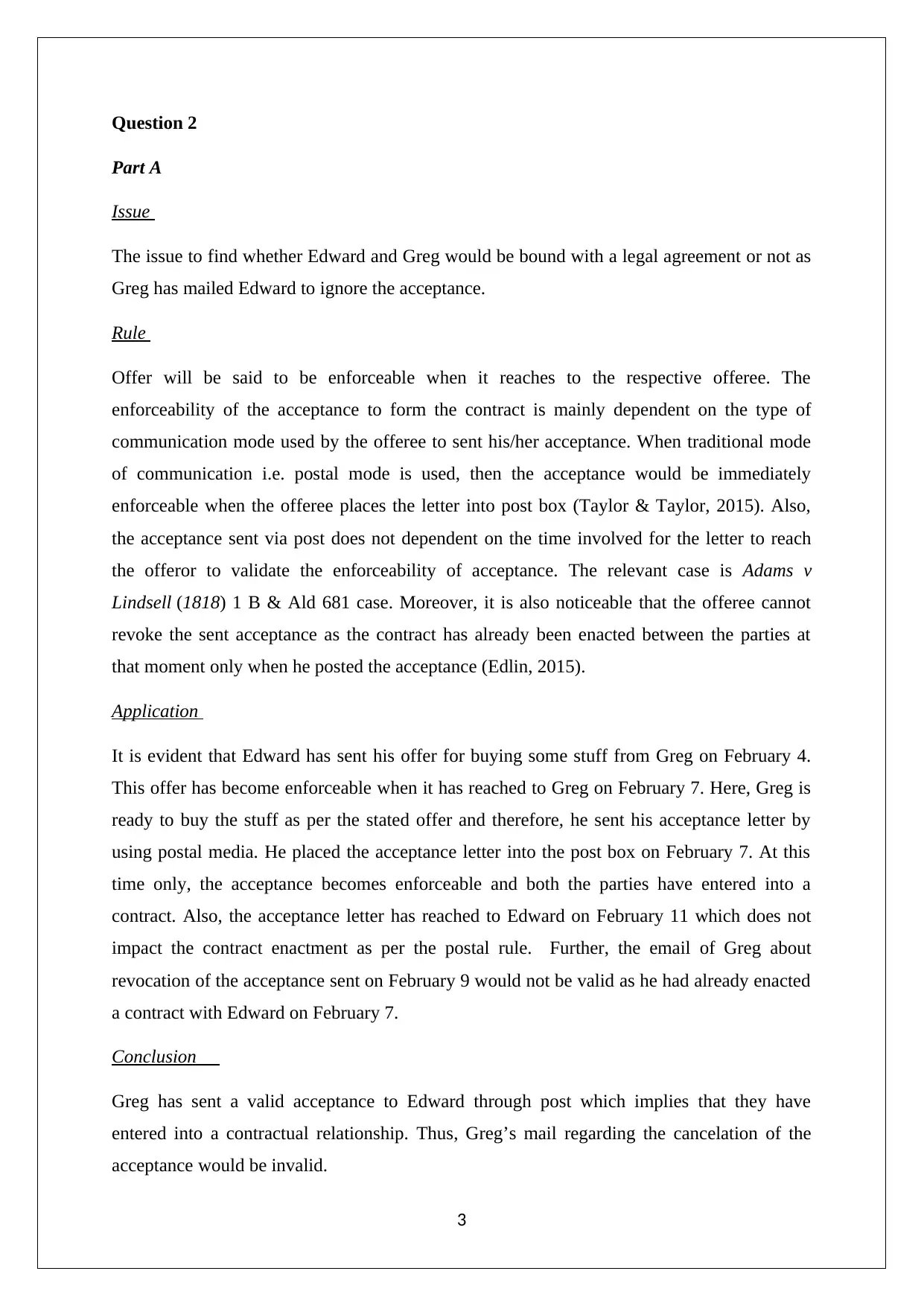
Question 2
Part A
Issue
The issue to find whether Edward and Greg would be bound with a legal agreement or not as
Greg has mailed Edward to ignore the acceptance.
Rule
Offer will be said to be enforceable when it reaches to the respective offeree. The
enforceability of the acceptance to form the contract is mainly dependent on the type of
communication mode used by the offeree to sent his/her acceptance. When traditional mode
of communication i.e. postal mode is used, then the acceptance would be immediately
enforceable when the offeree places the letter into post box (Taylor & Taylor, 2015). Also,
the acceptance sent via post does not dependent on the time involved for the letter to reach
the offeror to validate the enforceability of acceptance. The relevant case is Adams v
Lindsell (1818) 1 B & Ald 681 case. Moreover, it is also noticeable that the offeree cannot
revoke the sent acceptance as the contract has already been enacted between the parties at
that moment only when he posted the acceptance (Edlin, 2015).
Application
It is evident that Edward has sent his offer for buying some stuff from Greg on February 4.
This offer has become enforceable when it has reached to Greg on February 7. Here, Greg is
ready to buy the stuff as per the stated offer and therefore, he sent his acceptance letter by
using postal media. He placed the acceptance letter into the post box on February 7. At this
time only, the acceptance becomes enforceable and both the parties have entered into a
contract. Also, the acceptance letter has reached to Edward on February 11 which does not
impact the contract enactment as per the postal rule. Further, the email of Greg about
revocation of the acceptance sent on February 9 would not be valid as he had already enacted
a contract with Edward on February 7.
Conclusion
Greg has sent a valid acceptance to Edward through post which implies that they have
entered into a contractual relationship. Thus, Greg’s mail regarding the cancelation of the
acceptance would be invalid.
3
Part A
Issue
The issue to find whether Edward and Greg would be bound with a legal agreement or not as
Greg has mailed Edward to ignore the acceptance.
Rule
Offer will be said to be enforceable when it reaches to the respective offeree. The
enforceability of the acceptance to form the contract is mainly dependent on the type of
communication mode used by the offeree to sent his/her acceptance. When traditional mode
of communication i.e. postal mode is used, then the acceptance would be immediately
enforceable when the offeree places the letter into post box (Taylor & Taylor, 2015). Also,
the acceptance sent via post does not dependent on the time involved for the letter to reach
the offeror to validate the enforceability of acceptance. The relevant case is Adams v
Lindsell (1818) 1 B & Ald 681 case. Moreover, it is also noticeable that the offeree cannot
revoke the sent acceptance as the contract has already been enacted between the parties at
that moment only when he posted the acceptance (Edlin, 2015).
Application
It is evident that Edward has sent his offer for buying some stuff from Greg on February 4.
This offer has become enforceable when it has reached to Greg on February 7. Here, Greg is
ready to buy the stuff as per the stated offer and therefore, he sent his acceptance letter by
using postal media. He placed the acceptance letter into the post box on February 7. At this
time only, the acceptance becomes enforceable and both the parties have entered into a
contract. Also, the acceptance letter has reached to Edward on February 11 which does not
impact the contract enactment as per the postal rule. Further, the email of Greg about
revocation of the acceptance sent on February 9 would not be valid as he had already enacted
a contract with Edward on February 7.
Conclusion
Greg has sent a valid acceptance to Edward through post which implies that they have
entered into a contractual relationship. Thus, Greg’s mail regarding the cancelation of the
acceptance would be invalid.
3
⊘ This is a preview!⊘
Do you want full access?
Subscribe today to unlock all pages.

Trusted by 1+ million students worldwide
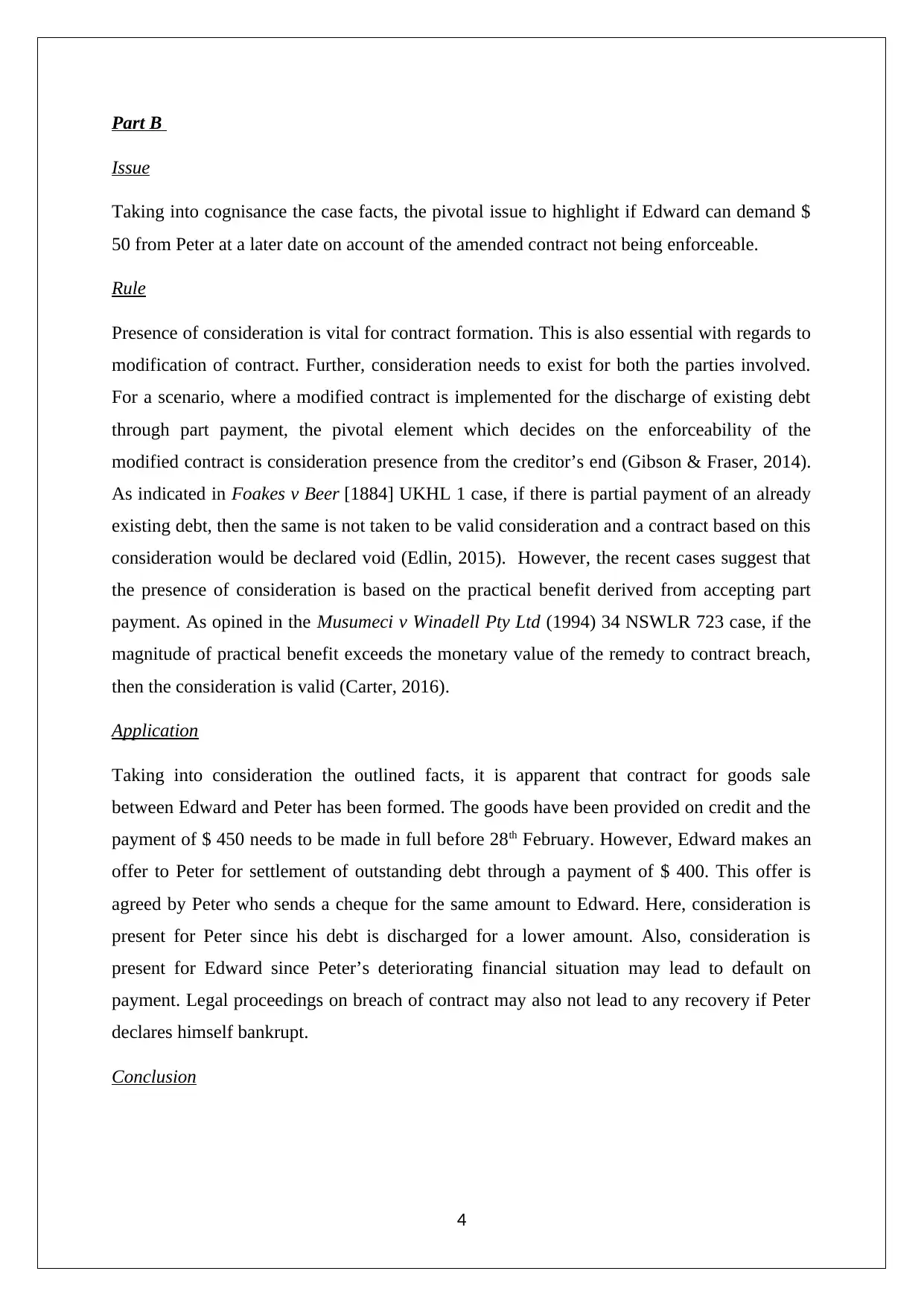
Part B
Issue
Taking into cognisance the case facts, the pivotal issue to highlight if Edward can demand $
50 from Peter at a later date on account of the amended contract not being enforceable.
Rule
Presence of consideration is vital for contract formation. This is also essential with regards to
modification of contract. Further, consideration needs to exist for both the parties involved.
For a scenario, where a modified contract is implemented for the discharge of existing debt
through part payment, the pivotal element which decides on the enforceability of the
modified contract is consideration presence from the creditor’s end (Gibson & Fraser, 2014).
As indicated in Foakes v Beer [1884] UKHL 1 case, if there is partial payment of an already
existing debt, then the same is not taken to be valid consideration and a contract based on this
consideration would be declared void (Edlin, 2015). However, the recent cases suggest that
the presence of consideration is based on the practical benefit derived from accepting part
payment. As opined in the Musumeci v Winadell Pty Ltd (1994) 34 NSWLR 723 case, if the
magnitude of practical benefit exceeds the monetary value of the remedy to contract breach,
then the consideration is valid (Carter, 2016).
Application
Taking into consideration the outlined facts, it is apparent that contract for goods sale
between Edward and Peter has been formed. The goods have been provided on credit and the
payment of $ 450 needs to be made in full before 28th February. However, Edward makes an
offer to Peter for settlement of outstanding debt through a payment of $ 400. This offer is
agreed by Peter who sends a cheque for the same amount to Edward. Here, consideration is
present for Peter since his debt is discharged for a lower amount. Also, consideration is
present for Edward since Peter’s deteriorating financial situation may lead to default on
payment. Legal proceedings on breach of contract may also not lead to any recovery if Peter
declares himself bankrupt.
Conclusion
4
Issue
Taking into cognisance the case facts, the pivotal issue to highlight if Edward can demand $
50 from Peter at a later date on account of the amended contract not being enforceable.
Rule
Presence of consideration is vital for contract formation. This is also essential with regards to
modification of contract. Further, consideration needs to exist for both the parties involved.
For a scenario, where a modified contract is implemented for the discharge of existing debt
through part payment, the pivotal element which decides on the enforceability of the
modified contract is consideration presence from the creditor’s end (Gibson & Fraser, 2014).
As indicated in Foakes v Beer [1884] UKHL 1 case, if there is partial payment of an already
existing debt, then the same is not taken to be valid consideration and a contract based on this
consideration would be declared void (Edlin, 2015). However, the recent cases suggest that
the presence of consideration is based on the practical benefit derived from accepting part
payment. As opined in the Musumeci v Winadell Pty Ltd (1994) 34 NSWLR 723 case, if the
magnitude of practical benefit exceeds the monetary value of the remedy to contract breach,
then the consideration is valid (Carter, 2016).
Application
Taking into consideration the outlined facts, it is apparent that contract for goods sale
between Edward and Peter has been formed. The goods have been provided on credit and the
payment of $ 450 needs to be made in full before 28th February. However, Edward makes an
offer to Peter for settlement of outstanding debt through a payment of $ 400. This offer is
agreed by Peter who sends a cheque for the same amount to Edward. Here, consideration is
present for Peter since his debt is discharged for a lower amount. Also, consideration is
present for Edward since Peter’s deteriorating financial situation may lead to default on
payment. Legal proceedings on breach of contract may also not lead to any recovery if Peter
declares himself bankrupt.
Conclusion
4
Paraphrase This Document
Need a fresh take? Get an instant paraphrase of this document with our AI Paraphraser
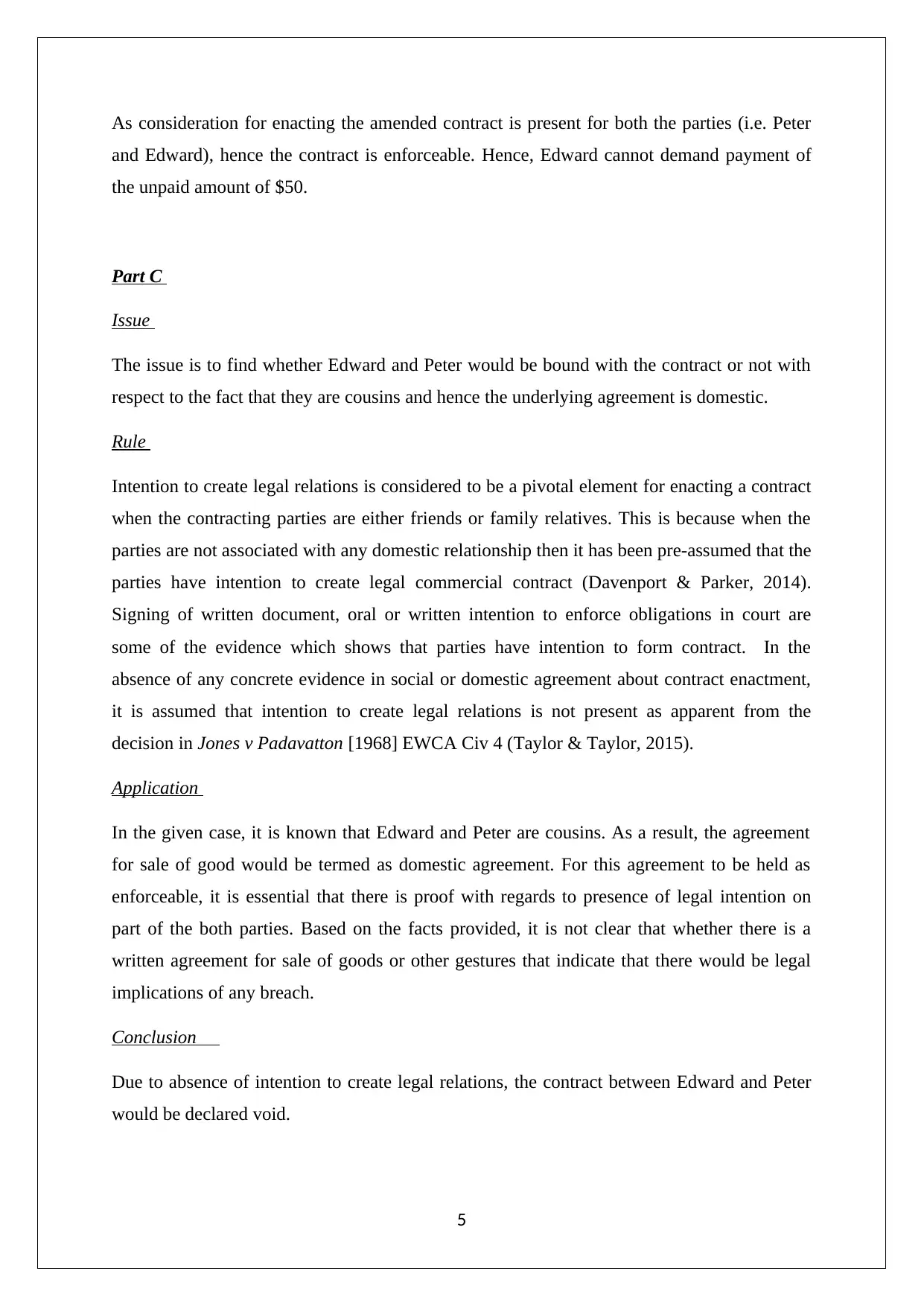
As consideration for enacting the amended contract is present for both the parties (i.e. Peter
and Edward), hence the contract is enforceable. Hence, Edward cannot demand payment of
the unpaid amount of $50.
Part C
Issue
The issue is to find whether Edward and Peter would be bound with the contract or not with
respect to the fact that they are cousins and hence the underlying agreement is domestic.
Rule
Intention to create legal relations is considered to be a pivotal element for enacting a contract
when the contracting parties are either friends or family relatives. This is because when the
parties are not associated with any domestic relationship then it has been pre-assumed that the
parties have intention to create legal commercial contract (Davenport & Parker, 2014).
Signing of written document, oral or written intention to enforce obligations in court are
some of the evidence which shows that parties have intention to form contract. In the
absence of any concrete evidence in social or domestic agreement about contract enactment,
it is assumed that intention to create legal relations is not present as apparent from the
decision in Jones v Padavatton [1968] EWCA Civ 4 (Taylor & Taylor, 2015).
Application
In the given case, it is known that Edward and Peter are cousins. As a result, the agreement
for sale of good would be termed as domestic agreement. For this agreement to be held as
enforceable, it is essential that there is proof with regards to presence of legal intention on
part of the both parties. Based on the facts provided, it is not clear that whether there is a
written agreement for sale of goods or other gestures that indicate that there would be legal
implications of any breach.
Conclusion
Due to absence of intention to create legal relations, the contract between Edward and Peter
would be declared void.
5
and Edward), hence the contract is enforceable. Hence, Edward cannot demand payment of
the unpaid amount of $50.
Part C
Issue
The issue is to find whether Edward and Peter would be bound with the contract or not with
respect to the fact that they are cousins and hence the underlying agreement is domestic.
Rule
Intention to create legal relations is considered to be a pivotal element for enacting a contract
when the contracting parties are either friends or family relatives. This is because when the
parties are not associated with any domestic relationship then it has been pre-assumed that the
parties have intention to create legal commercial contract (Davenport & Parker, 2014).
Signing of written document, oral or written intention to enforce obligations in court are
some of the evidence which shows that parties have intention to form contract. In the
absence of any concrete evidence in social or domestic agreement about contract enactment,
it is assumed that intention to create legal relations is not present as apparent from the
decision in Jones v Padavatton [1968] EWCA Civ 4 (Taylor & Taylor, 2015).
Application
In the given case, it is known that Edward and Peter are cousins. As a result, the agreement
for sale of good would be termed as domestic agreement. For this agreement to be held as
enforceable, it is essential that there is proof with regards to presence of legal intention on
part of the both parties. Based on the facts provided, it is not clear that whether there is a
written agreement for sale of goods or other gestures that indicate that there would be legal
implications of any breach.
Conclusion
Due to absence of intention to create legal relations, the contract between Edward and Peter
would be declared void.
5
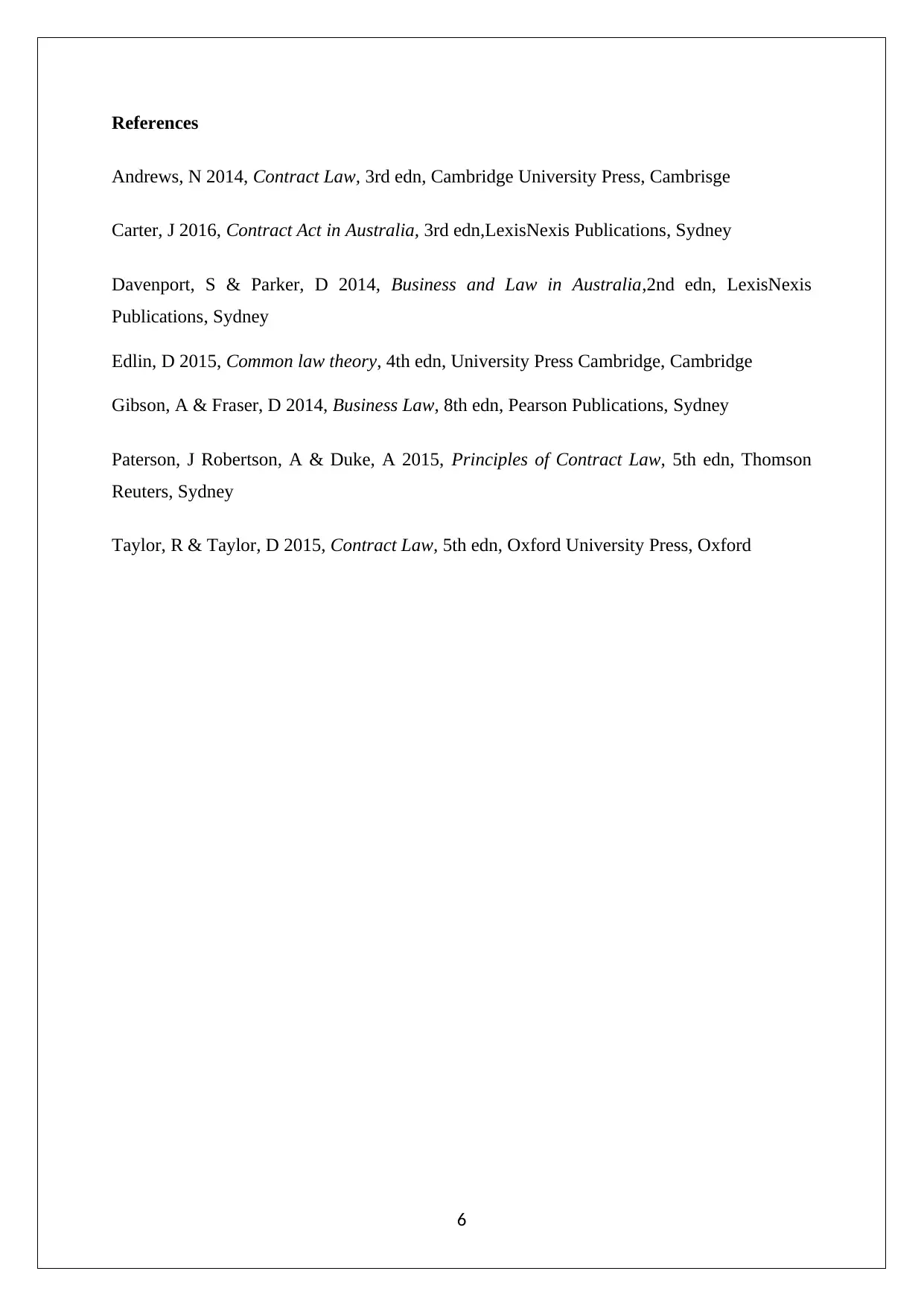
References
Andrews, N 2014, Contract Law, 3rd edn, Cambridge University Press, Cambrisge
Carter, J 2016, Contract Act in Australia, 3rd edn,LexisNexis Publications, Sydney
Davenport, S & Parker, D 2014, Business and Law in Australia,2nd edn, LexisNexis
Publications, Sydney
Edlin, D 2015, Common law theory, 4th edn, University Press Cambridge, Cambridge
Gibson, A & Fraser, D 2014, Business Law, 8th edn, Pearson Publications, Sydney
Paterson, J Robertson, A & Duke, A 2015, Principles of Contract Law, 5th edn, Thomson
Reuters, Sydney
Taylor, R & Taylor, D 2015, Contract Law, 5th edn, Oxford University Press, Oxford
6
Andrews, N 2014, Contract Law, 3rd edn, Cambridge University Press, Cambrisge
Carter, J 2016, Contract Act in Australia, 3rd edn,LexisNexis Publications, Sydney
Davenport, S & Parker, D 2014, Business and Law in Australia,2nd edn, LexisNexis
Publications, Sydney
Edlin, D 2015, Common law theory, 4th edn, University Press Cambridge, Cambridge
Gibson, A & Fraser, D 2014, Business Law, 8th edn, Pearson Publications, Sydney
Paterson, J Robertson, A & Duke, A 2015, Principles of Contract Law, 5th edn, Thomson
Reuters, Sydney
Taylor, R & Taylor, D 2015, Contract Law, 5th edn, Oxford University Press, Oxford
6
⊘ This is a preview!⊘
Do you want full access?
Subscribe today to unlock all pages.

Trusted by 1+ million students worldwide
1 out of 6
Related Documents
Your All-in-One AI-Powered Toolkit for Academic Success.
+13062052269
info@desklib.com
Available 24*7 on WhatsApp / Email
![[object Object]](/_next/static/media/star-bottom.7253800d.svg)
Unlock your academic potential
Copyright © 2020–2026 A2Z Services. All Rights Reserved. Developed and managed by ZUCOL.





